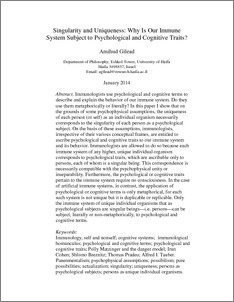Gilead, Amihud
(2014)
Singularity and Uniqueness: Why Is Our Immune System Subject to Psychological and Cognitive Traits?
[Preprint]
![[img]](https://philsci-archive.pitt.edu/style/images/fileicons/application_pdf.png)  Preview |
|
PDF
Gilead_-_Immunology,_singularity,_uniqueness__PhilSci_-_Archive.pdf
- Draft Version
Download (265kB)
|
Abstract
Immunologists use psychological and cognitive terms to describe and explain the behavior of our immune system. Do they use them metaphorically or literally? In this paper I show that on the grounds of some psychophysical assumptions, the uniqueness of each person (or self) as an individual organism necessarily corresponds to the singularity of each person as a psychological subject. On the basis of these assumptions, immunologists, irrespective of their various conceptual frames, are entitled to ascribe psychological and cognitive traits to our immune system and its behavior. Immunologists are allowed to do so because each immune system of any higher, unique individual organism corresponds to psychological traits, which are ascribable only to persons, each of whom is a singular being. This correspondence is necessarily compatible with the psychophysical unity or inseparability. Furthermore, the psychological or cognitive traits pertain to the immune system require no consciousness. In the case of artificial immune systems, in contrast, the application of psychological or cognitive terms is only metaphorical, for each such system is not unique but it is duplicable or replicable. Only the immune system of unique individual organisms that as psychological subjects are singular beings—i.e. persons—can be subject, literally or non-metaphorically, to psychological and cognitive terms.
| Item Type: |
Preprint
|
| Creators: |
|
| Keywords: |
Immunology, self and nonself; cognitive systems; immunological homunculus; psychological and cognitive terms; psychological and cognitive traits; Polly Matzinger and the danger model; Irun Cohen; Shlomo Breznitz; Thomas Pradeu; Alfred I. Tauber.
Panenmentalism; psychophysical assumptions; possibilism; pure possibilities; actualization; singularity; uniqueness; persons as psychological subjects; persons as unique individual organisms.
|
| Subjects: |
Specific Sciences > Biology
General Issues > Explanation |
| Depositing User: |
Prof. Amihud Gilead
|
| Date Deposited: |
30 Jan 2014 15:53 |
| Last Modified: |
30 Jan 2014 15:53 |
| Item ID: |
10249 |
| Subjects: |
Specific Sciences > Biology
General Issues > Explanation |
| Date: |
January 2014 |
| URI: |
https://philsci-archive.pitt.edu/id/eprint/10249 |
Monthly Views for the past 3 years
Monthly Downloads for the past 3 years
Plum Analytics
Actions (login required)
 |
View Item |



